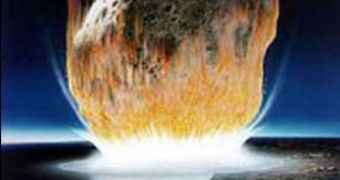Valid mathematical calculations based on accurate historical and present facts observations result in a theory that assumes it's more likely to die in a terrorist attack than being blown off by the impact of a meteorite's collision with the Earth. This sort of makes one ponder on the way money is spent in order to prevent threats to humanity.
Let's face it: it's obvious that, although terrorist attacks happen way more often than asteroid collisions, they affect a much smaller number of people. And, in order to be directly affected by one, you would have to be there yourself, while in the case of the latter, this does not apply. Meteorites kill millions, depending on their size, and they do so from a great distance, through their blast and heat wave or, if they fall into the ocean, via the huge tsunami waves generated. The theory has it that it only takes an asteroid somewhat larger than 10 km across in order for us to share the same fate as the dinosaurs, 65 million years ago. Of course, there are scientific opinions according to which they survived the meteor impact and went extinct because of other reasons, like volcanoes and climate change, but, besides the fact that we are not concerned with that at the moment, I assume that the meteor crash didn't please dinosaurs either.
So, a recent study concluded that there is a 1:700.000 chance to be killed as a result of an asteroid collision. A huge meteorite like the dinosaur-extinguisher meets the Earth's trajectory about once every 100 million years, which, divided by an average lifespan of, say, 70 years, yields a result of 1 every 1.5 million, without taking into consideration that we may actually live less. Smaller, still deadly asteroids hit our planet 1.000 times more frequently, but since they would only affect a thousandth of the global population, the odds remain about the same. And, by investing a relatively small amount of money (comparing, for example, to what is invested in anti-terrorist defenses and, especially, to the fact that this could save our lives at some point), these chances could be highly reduced.
There are some programs that could spot and eliminate worrisome meteorites or change their trajectory, but these will be scarce and only available in about ten years, such as the Ares missiles (ready in 2015). The total funding of such endeavors is estimated not to be larger than a few billion dollars, which is a sum worth paying to ensure that, at least on this side, we can still continue to exist. Now, if only the other major problems of humankind cost that low…

 14 DAY TRIAL //
14 DAY TRIAL //